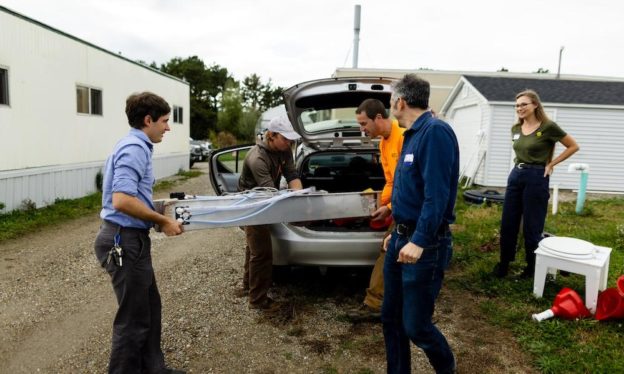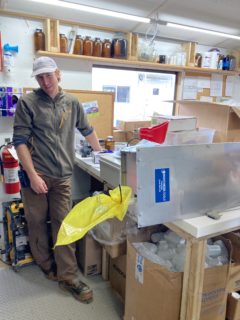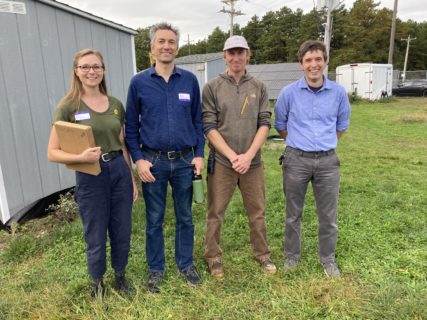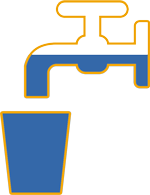Back to all articles
Urine Diversion: A Tool in the Toolbox for Cape Cod

The Rich Earth Institute delivers a Brightwater Tools urine pasteurizer to MASSTC. Image Credit: MASSTC
IN THE NEWS
- Cape Cod Faces a Rising ‘Yellow Tide’ Scientific American, February 12, 2024
- Cape Cod’s ‘power couple of pee-cycling’ wants you to save that liquid gold WBUR, February 12, 2024
- Falmouth Water Quality Committee Endorses Urine-Diversion Pilot Falmouth Enterprise, February 9, 2024
- Board Earmarks Funds For Urine-Diversion Pilot Program Falmouth Enterprise Nov 9, 2023
- State Recommends Fast-Tracking Urine-Diverting Toilets For Provisional Use Falmouth Enterprise September 19, 2023
- Urine-Diversion Enthusiast Prepares For Falmouth’s Pee Falmouth Enterprise July 6, 2023
- Falmouth Board of Health Says Urine Tanks Have Minimal Regs Falmouth Enterprise July 5, 2023
Waterways across Cape Cod, including both freshwater ponds and estuaries, are significantly impacted by nutrient pollution. Decades of accumulating nutrients from both wastewater systems and fertilizer runoff threaten aquatic ecosystems and human health — with implications for recreation, drinking water, and the regional economy.
According to the EPA, “an estimated 80 percent of nitrogen loading on Cape Cod stems from the use of traditional backyard septic systems, which are not designed to remove it. Nitrogen moves easily from the septic systems to the Cape’s groundwater, where it is transported to ponds, streams and estuaries.” Due to the significant level of nutrient pollution there, Cape Cod is required by the EPA to reduce their nitrogen emissions.
To achieve nutrient pollution reduction via sewering, it’s going to cost between $50,000 – $100,000 per house connected; a cost that will be borne by the town and therefore by the homeowners through their tax dollars. This high cost can lead to making housing unaffordable in a place where affordable housing is already hard to come by. The build out of these sewer systems will also take decades; some estimates say it will take up to 40 years to complete.
As a result of the huge problem with nutrient pollution both in ponds and the nays, a grassroots initiative to implement urine diversion on the Cape is underway. The Massachusetts Department of Environmental Protection has recommended that rather than doing a urine diverting pilot program, the town of Falmouth should skip the pilot stage and instead apply for provisional use for urine diversion. Through partners including Falmouth Pond Coalition, The Green Center, and the Massachusetts Alternative Septic System Test Center (MASSTC), a urine diversion project is now underway with 43 participants who have been outfitted with Rich Earth Institute’s urine collectors.
The Falmouth Select Board recently voted to allocate $80,000 in American Rescue Plan Act funds to support education and outreach that will lay the groundwork for an expanded four-year urine-diversion pilot project in town. Funding for the full four-year project will be up for a vote this Spring.
On October 17, our team traveled to Cape Cod for the Falmouth Pond Coalition gathering, to support the message that urine diversion can work synergistically with other nutrient pollution prevention strategies while serving as a more affordable, quicker-to-implement option.
We also delivered a Brightwater Tools pasteurizer to MASSTC, who will be processing the urine from the Falmouth pilot project.
Below, watch Research Director Abe Noe-Hays present “Urine Diversion: Another Tool in the Toolbox” at the Falmouth Pond Coalition:




